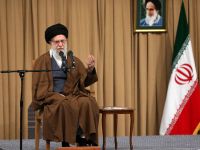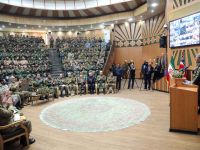Aviation kingpins Airbus and Boeing are optimistic that air transport hit hard by September's terror attacks in the United States will rebound once the global economic recession has ended and passengers regain confidence in the industry.
"We're absolutely convinced that the long-term growth rate of air traffic, of about six percent, will resume," a bullish Airbus president Noel Forgeard said Monday at the Dubai 2001 air show.
"There might be a downward pressure on figures, but there shouldn't be a tremendous impact," Randolph Baseler, Boeing vice president of marketing, said of the possible fallout from the September 11 outrages in New York and Washington.
Forgeard said Airbus had netted 326 firm sales worth $34.4 billion through the first 10 months of 2001, stressing confidence that the consortium would deliver around 320 aircraft in 2002.
Although the situation was very "fluid", Forgeard said there was an "excessive psychosis" and that Airbus was "confident of stabilizing production." "We're not so far considering lay-offs" among Airbus' 47,000 employees, and the A380 superjumbo program remained "unchanged", he said.
"I am confident we can maintain profitability through the crisis period before ramping it up," Forgeard said. "The good times will return." He said it was "exactly the right time" for the A380s, 22 of which Dubai-owned Emirates airline ordered Sunday in a deal worth seven billion dollars.
Seattle-based Boeing's Baseler was equally upbeat, although delivery figures of aircraft are estimated to fall from 522 this year to 350-400 in 2002, and below 350 in 2003. He said the only problem would come if the aviation industry did not bounce back because of a stagnating economy and if passengers remained "afraid of terrorist acts".
"We've had no cancellations, but we have had a number of airlines that have asked to move their orders out," he said. The Middle East will require 651 new commercial jet airlines worth $63 billion between 2001 and 2020, according to Baseler.
"The Middle East is expected to experience economic growth at higher than the world average during the next 20 years. In addition, the 4.2 percent air travel growth projection provides a strong foundation for expansion by the region's airlines," he said.
Forgeard said passenger traffic between 1990-2000 increased by 58 percent and "it will be the same during the period of 2001-2010." Both executives said competition had been put aside in efforts to guarantee safety and security for future airline passengers.
"There is no competition between players, manufacturers, even with Boeing, when it comes to security and safety measures for passengers. There is no room for competition," Forgeard said.
Shawn Vick, vice president of Canada's Bombardier Aerospace, which makes business jets, said airlines were showing increasing interest in buying more planes. "In my conversations with my colleagues from other manufacturers in the industry, everybody is beginning to see interest levels in their activities pick up," Vick said.
"People want to have access to high quality, safe and reliable transportation," Vick said. "Business aircraft and general aviation are a way to provide that service and I think our business will grow." Germany's Lufthansa, however, painted a less positive picture of the aviation business.
Board member Wolfgang Mayrhuber said airlines worldwide will cut between 120,000 and 200,000 employees in the aftermath of September's attacks that left thousands dead.
Total losses for these companies in the last quarter of 2001 will range between $12 and 15 billion, Mayrhuber said. He added that Lufthansa had currently grounded 43 aircraft, representing 28 percent of its fleet. "It's the most difficult time in our history." — (AFP, Dubai)
by Luke Phillips
© Agence France Presse 2001
© 2001 Mena Report (www.menareport.com)








